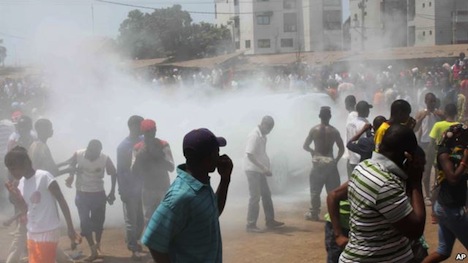Guinean voters were set to participate in their first parliamentary elections in over a decade later this well, despite protests over the vote earlier this year that overshadowed the elections and despite the fact that Guinea’s parliament hasn’t even met since 2008.![]()
But it seems increasingly likely that the scheduled June 30 elections will be postponed yet again after opposition protests over fairness and transparency, following six years of delay and political turbulence — just last week, fresh violence led Guinea’s opposition to pull out of talks with the government over the long-delayed election to its unicameral Assemblée nationale (National Assembly) of Guinea.
Its francophone neighbor to the north, Senegal, has a long history with democracy and, just last year, marked its second consecutive peaceful, post-election transfer of power when Macky Sall overwhelming defeated incumbent Abdoulaye Wade in the March 2012 presidential election.
Meanwhile, Guinea is still learning the ropes of democratic elections — it held its first direct election for president only in 2010. The ultimate winner, Alpha Condé, only narrowly defeated Cellou Dalein Diallo in the runoff, on a vote that broke on largely ethnic lines, with Condé consolidating support among the Malinke ethnic group (around 30% of Guinea’s population) and the Susu groups (around 20%), and with Diallo winning the support among his own Fula group (40% of Guinea’s population).
The disparity in rule of law and democratic institutions matters.
Guinea’s population (10.25 million) is just slightly less than that of Senegal’s (12.75 million), but its economy is less than one-half the size of Senegal’s, giving Guinea a GDP per capita of something like $1,100 to something like $2,000 for Senegal.
The 2010 election followed a relatively despotic era of governance for a country that came into being amid controversy. Continue reading Guinea struggles to schedule elections after opposition protests and six years of delay
